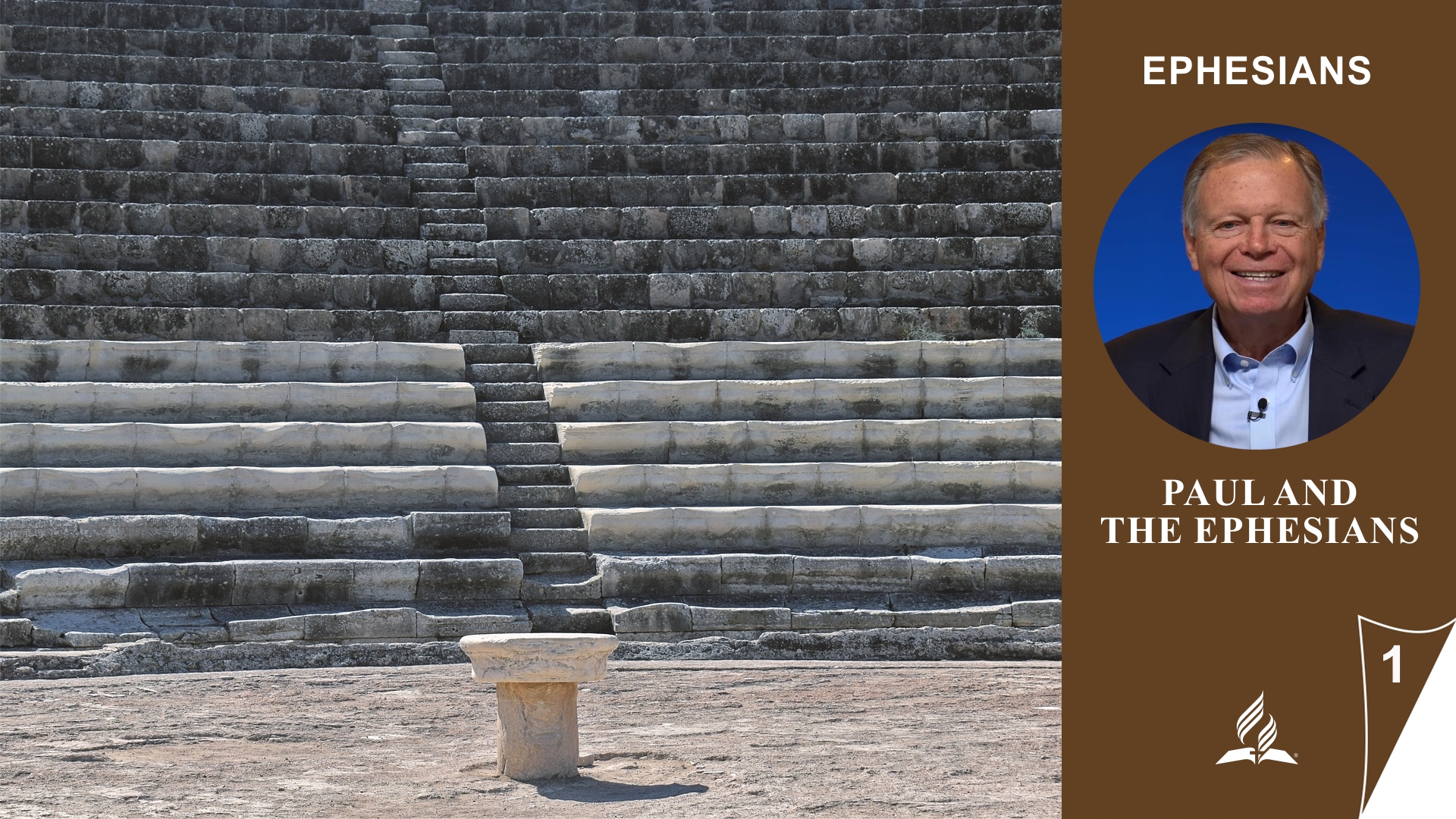
Series EPHESIANS with Pastor Mark Finley |
Lesson 1: Paul and the Ephesians |
An invitation to unity and activity: Paul and the Ephesians
The first lesson delves deeply into Paul’s mission in Ephesus, a city characterized by diverse beliefs and the worship of the goddess Artemis. Paul’s dedication and strategy in establishing Christianity in this environment take center stage. Through impressive events, such as the attempt by exorcists to use Jesus’ name, the uniqueness and dignity of Jesus’ worship were highlighted. The conflict in the amphitheater illustrates the economic tensions arising from Paul’s teachings. The letter to the Ephesians emphasizes the central importance of unity in Christ and the harmonious community of believers. Lastly, the Epistle to the Ephesians reveals Paul’s personal commitment and deep concern for the believers in Ephesus, while underscoring God’s grand redemption plan and the central role of Christ in the church.
Memory Text: Ephesians 1:9 – Making known to us the mystery of his will, according to his purpose, which he set forth in Christ as a plan for the fullness of time, to unite all things in him, things in heaven and things on earth. |
Content:
1.1 Paul, the Evangelist for Ephesus
A Journey of Dedication and Strategy: Paul’s Mission in Ephesus
Paul, the evangelist for Ephesus, demonstrated deep commitment to establishing Christianity amidst a city characterized by diverse beliefs and the worship of the goddess Artemis. His three-year stay in Ephesus during his third missionary journey reflected his strong desire to firmly root faith in Jesus Christ.
A notable event where seven exorcists attempted to use Jesus’ name led to widespread reverence for Jesus in the city. The result was not only a public burning of expensive magic books but also a significant realization for believers: the exclusivity and dignity of Jesus’ worship were clearly emphasized and distinguished from any mixing with other practices.
1.2 Uprising in the Amphitheater
Lessons for Our Time
The account of the uprising in the Ephesian amphitheater showcases the power of Paul’s testimony, threatening the city’s economic interests by impacting idol worship and tourism around the Artemis temple. Driven by financial fears, Demetrius’ actions led to a violent uproar where Artemis’ followers declared their loyalty, and Paul withdrew for safety reasons.
In his meeting with the elders of the Ephesian community, Paul shows deep compassion and emphasizes his service characterized by humility, perseverance, and the desire to proclaim the gospel and encourage believers to serve humbly and support each other based on Christ’s teachings and example. His longstanding connection to Ephesus and the letters he penned illustrate his dedication and the lasting impact of his ministry in this community.
1.3 Listening to the Letter to the Ephesians
The Living Community: Reading the Letter to the Ephesians Aloud
The Letter to the Ephesians consistently emphasizes unity in Christ and the importance of living as a community united in faith. Paul stresses unity between Jews and Gentiles, faith in Christ, and the impact of this faith on individual and communal life. Particularly touching is the emphasis on love, mutual respect, and unity, which form the core of the message and call believers to live harmoniously as one.
1.4 The Letter to the Ephesians in Its Time
Paul’s Heart for the Believers: The Beginning and End of the Letter to the Ephesians
The Letter to the Ephesians showcases Paul’s personal commitment and deep desires for the believers in Ephesus, starting with his self-understanding as an apostle and concluding greetings as a prisoner of Christ. His concern about the impact of his imprisonment on the believers in Ephesus is evident in Ephesians 3:13, while also casting a broad, praising view on God’s work of redemption. Penned in an elevated, rhetorical style around 62 AD in a Roman prison, the letter contains praise, prayers, and artistic metaphors highlighting the depth and significance of faith in Christ.
1.5 The Letter to the Ephesians: A Christ-Centered Letter
Unity in Diversity: Shaping God’s Grand Plan
The Letter to the Ephesians, announced by Paul’s emphasis on God’s plan to unite everything in Christ, consistently places Christ at the center. From his prison, Paul paints a picture of God’s universal plan where the church plays a central role, uniting as one in Christ, irrespective of ethnic background. Through metaphorical descriptions like the body, the temple, the bride, and the army of the church, he illustrates God’s intentions for the community of believers.
Seventh-day Adventists strive, in alignment with God’s plan from Ephesians 1:9-10, to create a diverse, multicultural, and cross-border community centered on Christ. The question of how to cooperate with God’s grand plan leads to valuing diversity and working towards unity in Christ.
1.6 Summary
The Letter to the Ephesians: A Call to Unity and Participation in the Divine Plan
Paul’s mission in Ephesus was marked by dedication and strategy to establish Christianity in a city with various beliefs. His influence led to deep reverence for Jesus and emphasized the exclusivity of Jesus’ worship. The account of the uprising in the amphitheater highlights the economic repercussions of Paul’s testimony and underscores his deep connection and dedication to the Ephesian community. The Letter to the Ephesians emphasizes unity in Christ and the importance of harmonious living. Paul’s personal commitment and concern for the believers are evident in the letter, which, despite his imprisonment, emphasizes God’s work of redemption and the central place of Christ. The letter also emphasizes the importance of diversity in unity and the central role of the community in God’s grand plan, with Christ at the center.
(Visited 32 times, 1 visits today)




















